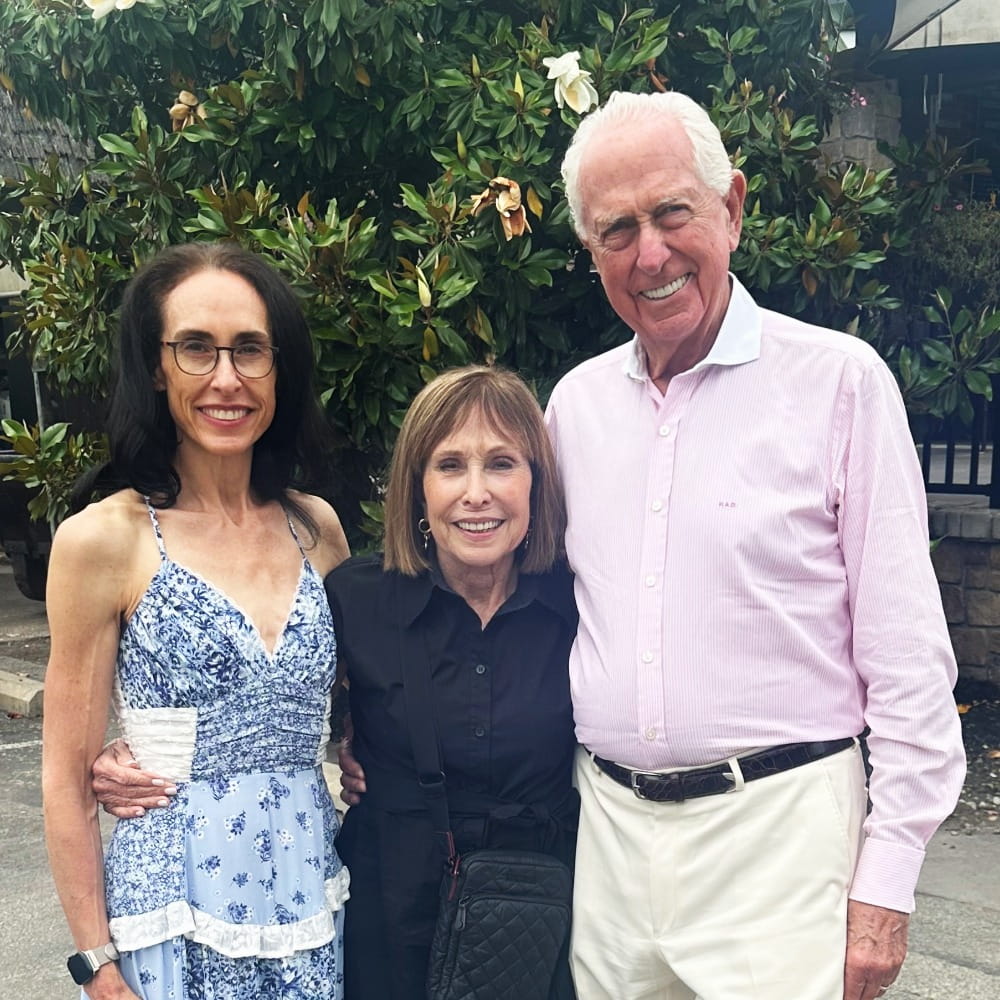Jessica’s story: Genetic testing revealed a lifesaving surprise

When Jessica Getson decided to undergo genetic testing for cancer, her friends and family were mystified.
"They couldn't understand why I would want to do this since cancer wasn't a thing in my family," she says. "As it turns out, it saved my Iife."
During a routine visit for her annual gynecology exam, Jessica picked up a brochure about genetics and risk assessment. "I didn't realize this was even something you could do. I thought genetic testing was only for people diagnosed with cancer. But as I read about it, I thought, 'why not?' I have always been a 'give me knowledge, give me power' kind of person."
Jessica met with a genetic counselor in the Genetics and Risk Assessment Program at Main Line Health. Together, they delved into her family history and then took a blood sample for the test. A few weeks later, she got a call to go over the test results.
"The genetic counselor was wonderful — patient, kind, empathic, sensitive and incredibly thorough. To my shock, I learned I have a CHEK2 breast cancer gene mutation as well as an APC gene mutation, which puts you at risk for colorectal cancer and polyps. I was in disbelief that I had not only one gene related to cancer, but two."
Jessica's Ashkenazi Jewish heritage put her at higher risk for certain genetic mutations. "Many people are aware of the link between Ashkenazi Jewish heritage and an increased chance for certain genetic changes in the BRCA1 and BRCA2 genes, but there are changes in other genes, like APC and CHEK2, that are more commonly seen as well," says Rachael Brandt, PhD, MS, Licensed Certified Genetic Counselor and Manager of the Genetics and Risk Assessment Program at Main Line Health.
But the risk is not the same for every gene mutation. "We've learned over time that different types of changes within a gene can cause different levels of risk," Dr. Brandt explains. "For example, while the APC gene variant seen in Jessica is present in about 6% of the Ashkenazi Jewish population, its connection with colorectal cancer is significantly lower than the risk seen with other genetic mutations in APC."
High-risk monitoring
Once Jessica's CHEK2 genetic mutation was identified, she became a candidate for increased-risk breast cancer monitoring. The genetics team facilitated connecting her to a care team. She began annual visits with Jennifer Sabol, MD, a board-certified general surgeon specializing in diagnosis and treatment of breast cancer at Main Line Health, and an annual breast MRI in addition to her annual mammogram. This schedule ensured that she had imaging every six months to help catch any developing cancer at its earliest, most treatable stage.
"It was important to me to develop a plan right away," Jessica says. She met with Josh Fosnot, MD, a plastic and reconstructive surgeon who performs surgery at Bryn Mawr Hospital, as well as Dr. Sabol. "We talked about options that included prophylactic mastectomy and prophylactic tamoxifen. I wanted to explore everything." They ultimately decided to continue with increased surveillance based on the national guidelines.
This high-risk monitoring continued for a few years. Then an MRI in February 2024 showed a suspicious finding, which led to a biopsy.
"I came home from the biopsy and said to my husband, Brian, 'I'm pretty sure I have breast cancer.' I don't know why, but I just knew that I did."
She was right.
Early breast cancer diagnosis
Once she got the diagnosis, Jessica called to thank her genetic counselor for the important work they are doing. "She saved my life. Had I not had the high-risk monitoring, the tumor would have grown for another six months until my mammogram. If that were the case, I would have had a very different prognosis, and I don't know that I would even be here today."
Armed with her plan from years before, Jessica elected to have a double mastectomy and DIEP flap reconstruction, which uses tissue, blood vessels, fat and the skin from the lower abdomen to recreate breast mounds.
"I was never worried. I knew I was in the best hands with my surgical team," Jessica says. "Having implants is a very personal decision and there's no right or wrong. I just personally was not comfortable with implants for my reconstruction. I call my reconstructed breasts my stoobs because they are my stomach boobs."
Branching out

While cancer had not previously been part of her family tree, once Jessica was diagnosed with breast cancer, other family members elected to undergo genetic testing. Her father has the CHEK2 mutation and has been successfully treated for thyroid and prostate cancer. Jessica's brother also has the APC mutation and they both have had precancerous polyps found during colonoscopies, so they undergo monitoring for colorectal cancer with more frequent colonoscopies. Jessica also has a thyroid and neck ultrasound every two years to check for thyroid cancer based on her family history. Her three college-aged children all have the option to have genetic testing to help define their cancer risks and care plan.
"For me, it was important to turn this lifesaving knowledge into action. I never miss a doctor's appointment. I want to be here for another 50 years," Jessica says.
She feels so strongly about this that she posted her story on social media to encourage others to get tested, even offering to take them to an appointment. Among the people who reached out to her was a close friend, who subsequently underwent genetic testing and learned she had a BRCA2 mutation.
"It wasn't about my breast cancer. I didn't need pity. I didn't need people to tell me they were proud of me, or that I'm a warrior. I just wanted people to hear the story about how genetic testing saved my life — and I got tested on a whim. I never knew it was possible, and I wanted people to know that it is absolutely possible, easy to do and potentially lifesaving."
"While genetic testing can be as simple as providing a blood or cheek swab sample," cautions Dr. Brandt, "genetic counseling is the key to the process, so people can review the pros, cons and limitations of this decision to feel sure it's right for them."
Breast cancer has been a gift to me
At age 53, Jessica says breast cancer has improved her life in ways she never would have expected. "Ever since cancer, I have prioritized my health," she says. "I never used to enjoy cooking and now I love to cook. I changed my eating habits and lost a lot of weight. I am very fit now. I do Pilates classes nearly every day and I love it."
She has even brought her cancer experience into her work as a counselor. She specializes in addictions, eating disorders, anxiety disorders, OCD, depressive and bipolar disorders — and now people coping with cancer.
"After successfully overcoming my own battle with breast cancer, I am dedicated to helping others facing similar challenges. I provide counseling to those impacted by cancer, whether they're patients, survivors, caregivers or loved ones. By providing support, guidance and strategies, individuals are better prepared to navigate the emotional, mental and practical aspects of their cancer journey."
Next steps
Concerned about what’s in your family tree? Learn more about the Genetics and Risk Assessment Program
Make an appointment with Jennifer Sabol, MD
Make an appointment with Rachael Brandt, PhD
Learn more about cancer care at Main Line Health
 Content you want, delivered to your inbox
Content you want, delivered to your inbox
Want to get the latest health and wellness articles delivered right to your inbox?
Subscribe to the Well Ahead Newsletter.
